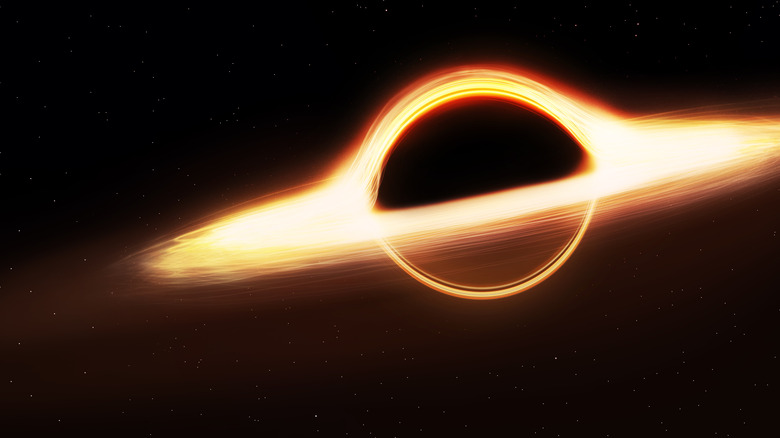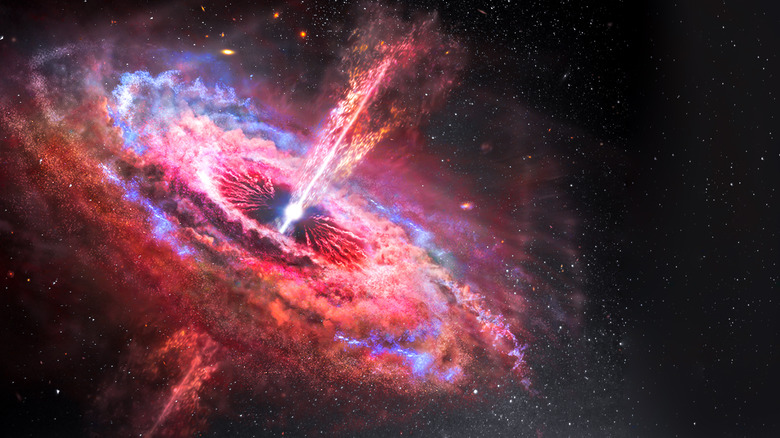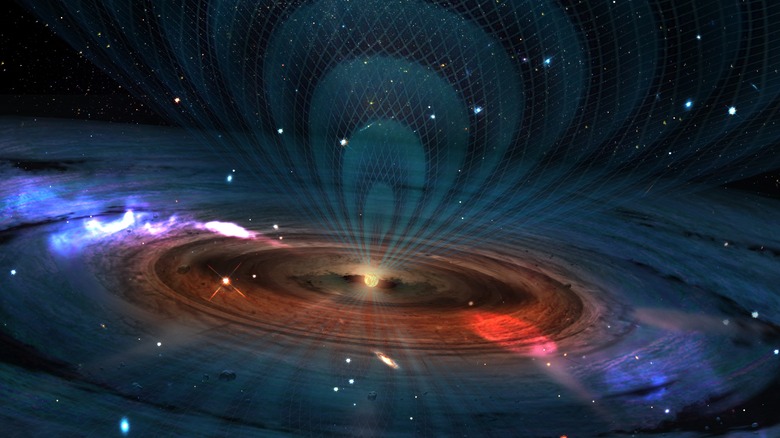What Stephen Hawking's Area Theorem Really Means
The world of theoretical physics is one fraught with mystery and intrigue. The secrets of the universe have yet to be fully cracked open by scientists, but they're getting closer every day. And one such scientist who made significant contributions to the field was Stephen Hawking.
Born on January 8, 1942, Hawking was one of the most famous and important scientists of all time. He contributed heavily to the fields of theoretical physics and quantum mechanics (per The Royal Society). His theories and concepts, such as Hawking radiation and his ideas on primordial black holes, helped create a foundational understanding of black holes.
But scientists believe that one of Hawking's theories may have recently been confirmed for the first time ever: Hawking's black hole theory. As MIT News explains, Hawking's black hole theory was first introduced in 1971 and was confirmed by physicists in 2021, after observations of gravitational phenomenaa around black holes.
But what is this theorem, so to speak? And how was it changed by Hawking's area theorem? To start, one should first know the background of Hawking himself.
Stephen Hawking's immeasurable impact on cosmology
Stephen Hawking was one of the most influential figures in the study of black holes and pushed forward our understanding of the regions of space by investigating commonly held beliefs about them at the time. As the Royal Society Publishing explains, Hawking thought about whether black holes could ever really be detectable.
Many scientists at the time held onto the belief that black holes only take stuff in, like a cosmic vacuum, and never send things out. But Hawking was actually able to prove this wrong. He posited that black holes not only emit particles as Hawking radiation — they can also be detected in order to study black hole phenomena.
As Phys.org states, this understanding of black hole behavior forever changed how the world of science saw these violent, cosmic phenomena. Hawking's other idea, area theorem, would also soon change black hole theory.
What are black holes anyway?
Black holes are kind of like the big bullies of the universe. They're huge, violent, and get in everyone's face. In science terms, a black hole can be thought of as an incredibly dense region of space where gravity is too strong to escape from. As Britannica explains, black holes are made up of tightly concentrated matter that all got crunched together from its own gravity (like garbage does in a garbage compactor). Black holes have a few sources of origin, but often they are made from dying stars collapsing in on themselves.
Another incredible fact about black holes is that even light itself gets sucked in, making them fairly difficult to detect (via Astronomy). Black holes also all have what is known as an event horizon, as explained by Space. This is basically their boundary before the point of no return for anything that happens to be near a black hole. Hawking's area theorem attempted to build an understanding of how event horizons could change or function over time.
Why Hawking's area theorem is monumental
Taking all of that crucial information about black holes into consideration, one can then start to understand what area theorem is and why it's important. As explained by Popular Mechanics, Stephen Hawking posited that it is impossible for a black hole's event horizon to ever shrink in size. This is important because at a quantum level, black holes can reduce their overall surface area through radiation emissions. And if this occurs, then a black hole's event horizon would either stretch or constrict. As MIT says, this was confirmed through the Laser Interferometer Gravitational-wave Observatory in 2021.
To confirm this, they basically used equipment to measure a black hole merger — when two black holes combine together — and analyze the gravitational waves that resulted. The technology and science behind it are both complicated, but the project produced staggering results on science's understanding of mergers and binary black hole systems.
Binary black hole systems are also explained with Hawking's theorem
But what are binary black hole systems, then? And what do they have to do with Stephen Hawking's area theorem? It's actually fairly simple and straightforward. As Purdue University explains, binary black hole systems are basically when two black holes orbit each other very closely. Binary means two, so two black holes in one system.
When two black holes are so close to each other, they will inevitable combine together into one massive blackhole. This is a bit similar to bubbles circling a drain: eventually they will come together from gravity itself. Binary black hole systems, like many concepts in cosmology, are still not yet fully understood by scientists, though more information surfaces every day. As Penn State University says, binary systems might explain what happens when supermassive black holes merge.
Hawking's area theorem set out to explain how black hole binary systems change their surface area during a merger (via MIT).
Hawking's theorem proves black hole mergers can't produce smaller event horizons
So, black hole binary systems will eventually lead to a merger, as understood by current scientific evidence. But what does this actually do to their event horizons once they actually merge into one supermassive black hole? Hawking's area theorem can be used to explain that.
As explained by MIT, area theorem holds that the new black hole produced when two black holes come together must never have an event horizon smaller than the original. Because scientists were able to successfully confirm that the event horizon did not shrink in the black hole merger they studied, Hawking was proven right. However, while this rule holds up in many cases, there is one exception to Hawking's theorem itself: Hawking radiation. As Popular Mechanics says, it is actually possible for a black hole to shrink its surface area through emissions. The particles expelled from a black hole are called Hawking radiation, and this can happen naturally over time as a black hole evaporates.
Hawking was a scientific genius who will be missed by many. His theories seem to hold up to this day as scientists continue to unearth the deepest secrets of the cosmos.





